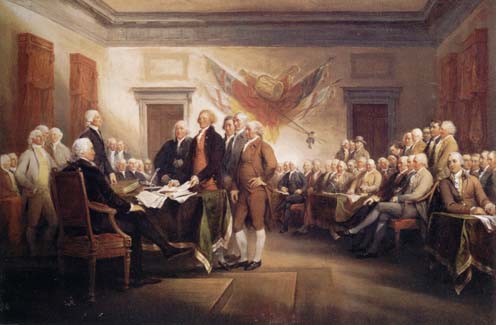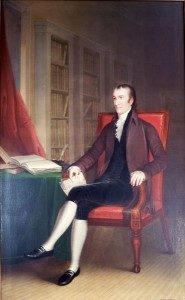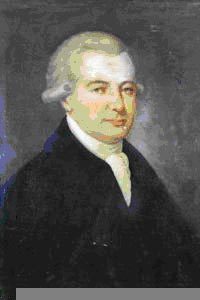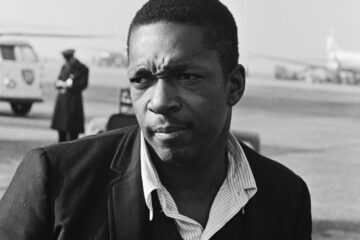Those Who Stood Up and Signed: Part 13

I still remember how our Social Studies in high school drilled into our minds how the signers of the Declaration of Independence were risking their lives signing that document. That they were, yet they were not going to allow themselves to be bullied to by any music celebrity, actor, anyone who considered themselves “royalty”, or anyone regardless of their religious beliefs, sexual preferences, country of origin or gender.
Much like their world, in today’s world, standing up for a certain political view can get you seriously injured or killed. Neither side has a monopoly on peace or love. If you dare defy an anti-Trump protester one can get seriously hurt, injured, tortured on Facebook, or killed. The events in Charlotte, NC have shown us that that evil organization, the KKK is still active too.
I want us to better understand these 56 men who were willing to risk everything for their country. So, in the following weeks, I am going to tell you about them, in alphabetical order mostly. I am not sure how many weeks it is going to take. I guess it will be based on how much I can actually find out about them as individuals.
Most of the biographical information will be taken from The Society of the Descendants of the Signers of the Declaration of Independence which gives extensive bios of each of the signers. Here, I shall highlight some of the parts of their lives that showed their character and spirit.
Benjamin Rush (01/04/1746-04/19/1813) was from a Quaker family and went to school in Maryland at the Nottingham Academy. He also studied medicine under a doctor in Philadelphia for six years but he eventually went to Edinburgh, Scotland to get his Doctor of Medicine degree. During his time there, he met Richard Stockton and helped him to convince Dr. John Witherspoon to become the president of the College of New Jersey (Princeton University). He visited hospitals in London and Paris, where I am sure his belief in independence from Britain was bolstered. On returning home, he started his own medical practice. Inn 1773, he became involved in the writing of anti-British political essays and joined a seat in Congress representing Pennsylvania in July of 1776. He signed the Declaration in August of that year. During the war, he traveled with the Continental army and became the Surgeon General of the Continental Army in 1777. He was a member of the American Philosophical Society and was cofounder and vice president of the Philadelphia Bible Society.
“Rush was a social activist, a prominent advocate for the abolition of slavery, and advocate for education for the masses, including women, and for public clinics to treat the poor. He believed in providing treatment for the mentally ill, treating them with compassion and was known as the father of psychiatry.”
 Thomas Stone (1743-10/5/1787) was a Marylander who loved learning. When he was 15, he would wake up every morning and ride more than 10 miles (by horseback, obviously) to study Greek and Latin and was already a lawyer at 21. “He began in 1765 circuit court riding between Port Tobacco to and from Frederick, Annapolis, and Philadelphia.”His law practice was successful and he soon became involved in politics too. He was madly in love with his wife and wanted peace and constantly sought a peaceful solution to the conflict with Britain. Though he signed the Olive Branch petition and sought peace, he knew what was at stake:
Thomas Stone (1743-10/5/1787) was a Marylander who loved learning. When he was 15, he would wake up every morning and ride more than 10 miles (by horseback, obviously) to study Greek and Latin and was already a lawyer at 21. “He began in 1765 circuit court riding between Port Tobacco to and from Frederick, Annapolis, and Philadelphia.”His law practice was successful and he soon became involved in politics too. He was madly in love with his wife and wanted peace and constantly sought a peaceful solution to the conflict with Britain. Though he signed the Olive Branch petition and sought peace, he knew what was at stake:
“On July 12, Thomas Stone wrote as follows to the Maryland Council of Safety: . . .May God send Victory to the Arm lifted in Support of righteousness, Virtue & Freedom, and crush even to destruction the power which wantonly would trample on the rights of mankind.”
Even though he eventually lost his wife to an injection of Mercury in a smallpox inoculation, “Thomas Stone was a tall, thin, pale lawyer, a gentleman of acknowledged talents, and of inflexible and incorruptible integrity. He was a professor of religion, and distinguished for a sincere and fervent piety.”
George Taylor (1716-02/23/1781) was another, “rags to riches” story. He came to the American colonies as an indentured servant at an ironworks in Philadelphia. He worked really hard and one day became the owner in 1742. The business prospered under him and his prosperity led him to active in the local militia and, “…became active in public affairs and was commissioned as a justice of the peace in 1757 and again in 1761 and 1763.”After the death of his wife, he moved to what is now Easton/Allentown PA. He continued in various ironworks businesses and in the local militias, becoming a Colonel. He and the other Pennsylvania delegates signed on August 2nd.
“Later he served on the committee that drew up resolutions calling for states to raise troops. In January 1777, he was selected by the Congress to arrange and preside at the Indian Treaty Conference in Easton, PA. In March, he was elected to the new Pennsylvania Supreme Executive Council but retired shortly thereafter due to illness.” Illnesses and business problems would plague him for the next five years, before he died.
Matthew Thornton (1714-06/24/1803) was another signer who was born in Ireland and with his family, immigrated. However, he came from a family of means and settled in what is now Maine. His family sent him to Worcester Academy. He studied medicine and at the age of 26 started his own medical practice. He was always anti-British and in 1765, participated in protesting the Stamp Act. He then got involved in the New Hampshire local militia and took on a few state positions, including New Hampshire’s Chairman of the provincial committee of safety in charge of raising troops and arms.
He issued the following statement when he elected to a position:
“…Painful beyond expression, have been those scenes of blood and devastation which the barbarous cruelty of British troops have placed before our eyes. Duty to God, to ourselves, to posterity, ends forced by the cries of slaughtered innocents, have urged us to take up arms in our own defence….we seriously and earnestly recommend the practice of that pure and undefiled religion, which embalmed the memory of our pious ancestors, as that alone upon which we can build a solid hope and confidence in the Divine protection and favour, without whose blessing all the measures of safety we have, or can propose, will end in our shame and disappointment.”
He did not sign on July 4th or August 2nd but soon thereafter. He worked tirelessly, even serving in the New Hampshire State Senate into his 70s. He also wrote essays, letters to newspapers, religious papers, and loved to entertain people with satire!
 George Walton (1741-02/02/1804) ‘s birthdate and year are unknown but he was another “rags to riches” story. He worked for most of his life as an apprentice carpenter in Virginia but he loved to learn. In 1769, he moved to Georgia and started studying law at the office of Henry Young. He also pursued studies in masonry. In 1774, he became both a lawyer and a Master Mason. As he was a hard-worker, he became successful in both endeavors and became involved in politics. He was pulled to side of those who supported independence by Henry Young and Dr. Lyman Hall, even though Georgia as a colony was generally pro-British. Walton, Young, and Hall worked tirelessly to convince other Georgians that independence was the right course. It paid off when in 1776, the Georgia Assembly (against the Govenor’s wishes) recognized their wisdom and said they were for independence and sent Walton and other delegates to the 2nd Continental Congress. During the war, he fought with the Georgia militia and received the rank of Colonel.
George Walton (1741-02/02/1804) ‘s birthdate and year are unknown but he was another “rags to riches” story. He worked for most of his life as an apprentice carpenter in Virginia but he loved to learn. In 1769, he moved to Georgia and started studying law at the office of Henry Young. He also pursued studies in masonry. In 1774, he became both a lawyer and a Master Mason. As he was a hard-worker, he became successful in both endeavors and became involved in politics. He was pulled to side of those who supported independence by Henry Young and Dr. Lyman Hall, even though Georgia as a colony was generally pro-British. Walton, Young, and Hall worked tirelessly to convince other Georgians that independence was the right course. It paid off when in 1776, the Georgia Assembly (against the Govenor’s wishes) recognized their wisdom and said they were for independence and sent Walton and other delegates to the 2nd Continental Congress. During the war, he fought with the Georgia militia and received the rank of Colonel.
“He was accused of a degree of pedantry, and sometimes indulged his satirical powers beyond the strict rules of propriety. He was perhaps, also, too contemptuous of public opinion, especially when that opinion varied from his own. On balance, however, it can reasonably be concluded that the orphaned carpenter’s apprentice became the most exalted citizen of the Commonwealth in which he resided”!
William Whipple (01/14/1730-11/28/1785) was born in what is now Maine but represented New Hampshire at the Continental Congress. His father was a merchant who owned several ships and by 21, William Whipple was the captain of his own. William amassed a sizeable fortune of his own by trading in the West Indies but left it all behind at the age of 29 to go into business in New Hampshire.
“Mr. Whipple soon entered with spirit into the controversy between Great Britain and the colonies, and being distinguished for the general probity of his character, as well as for the force of his genius, was frequently elected by his townsmen to offices of trust and responsibility.” Among those elections was one to the 2nd Continental Congress, where he signed the Declaration on August 2nd. He served with distinction in the New Hampshire militia, obtaining the rank of Brigadier General.
He realized that during the war, the new country could not survive on slave labor and eventually freed all of his slaves. He was well known for his generosity and benevolence to all.
Romans 12:2 Do not be conformed to this world, but be transformed by the renewal of your mind, that by testing you may discern what is the will of God, what is good and acceptable and perfect.
————————————————————W.







No Comment